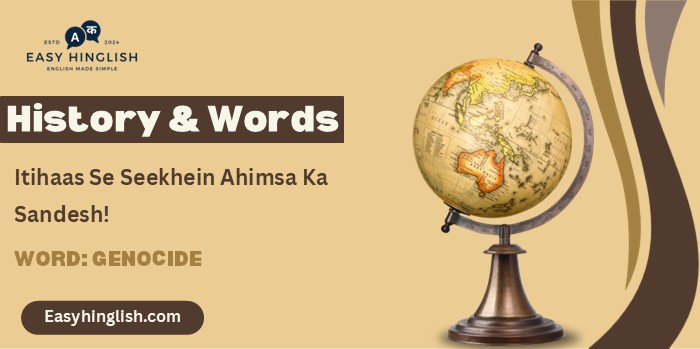History & Words: ‘Genocide’ (24 April)
Welcome to ‘History & Words’! 🌟 Main hoon Prashant, Wordpandit aur Learning Inc. Network ka founder. Yeh series language learning aur historical context ko connect karti hai, taaki vocabulary improve ho aur history ki understanding bhi deep ho.
Chaliye, shabdon ki iss journey par mere saath chaliye aur naye naye words explore karte hain. Aaj ka vishay gahan hai, kathin hai—aur zaroori bhi. 🕯️
🔍 Word of the Day: Genocide
Pronunciation: /ˈdʒɛnəˌsaɪd/ (JEN-uh-side)
🌍 Parichay (Introduction)
24 April 1915—Ottoman Empire ke authorities ne Constantinople (modern-day Istanbul) me hundreds of Armenian intellectuals aur leaders ko arrest kiya.
Yeh pehla step tha ek horrifying plan ka: Armenian Genocide, jisme 1.5 million Armenians ko systematic torture, deportation aur murder ke zariye eliminate kiya gaya.
“Genocide” ek word tha jo tab exist nahi karta tha, par 1944 me Polish-Jewish scholar Raphael Lemkin ne is term ko coin kiya—taaki aisi atrocities ka naam aur legal recognition dono ho.
🌱 Shabd ka Utpatti (Etymology)
“Genocide” bana hai do roots se:
- Genos (Greek) – “Race” or “tribe”
- -Cide (Latin) – “Killing” (as in homicide, infanticide)
Raphael Lemkin ne 1944 me WWII ke dauraan Axis Rule in Occupied Europe naam ki kitab me is term ka use kiya. Uska aim tha ek aise act ko define karna jo sirf mass murder nahi, balki intentional annihilation of an identity ho.
📖 Mahatvapurn Shabdavali (Key Vocabulary)
- 🔑 Ethnic Cleansing: A group ko forcibly remove karna ek region se
- 🔑 Crimes Against Humanity: Widespread, systematic attacks on civilian populations
- 🔑 Persecution: Violence or discrimination based on race, religion, or identity
- 🔑 Deportation: Forced displacement from home or homeland
- 🔑 Denialism: Historical events ke existence ko refuse karna, especially genocides
🏛️ Itihasik Sandarbh (Historical Context)
Armenian Genocide ko aksar “the forgotten genocide” kaha gaya hai:
- 1915 ke baad, Ottoman Empire ne Christian Armenian minority ko target karna shuru kiya
- 24 April: Armenian intellectuals ko pehle arrest kiya gaya, fir unka trace nahi mila
- Iske baad deportations, death marches aur mass executions systematically organized hue
- Survivors ko deserts me bheja gaya bina food, shelter ya support ke
Yeh modern history ka pehla state-orchestrated ethnic genocide tha—jiska recognition politics, denial aur diplomacy ke bich fasa raha hai.
⏳ Samayrekha (Timeline)
- 24 April 1915: Armenian intellectuals arrested in Constantinople
- 1915–1917: Deportations, executions, starvation, and death marches
- 1919–1920: Ottoman leaders par trials hone ki koshish, lekin accountability fail hoti hai
- 1944: Raphael Lemkin coins “genocide” inspired by the Armenian and Jewish experiences
- 1948: UN Genocide Convention adopt hoti hai
- Present: Dozens of countries Armenian Genocide ko recognize kar chuke hain
🌟 Is Din ka Mahatva (The Day’s Significance)
24 April har saal Armenian Genocide Remembrance Day ke roop me manaya jaata hai:
- Yeh din un logon ke liye hai jinka naam, identity, aur culture khatam kar diya gaya
- Yeh din isliye bhi important hai kyunki “genocide” jaise terms tabhi bante hain jab humanity fail hoti hai
- Armenian Genocide ne ek aisa linguistic vacuum fill kiya jisme pain ke liye shabd nahi the
Yeh din ek global ethical responsibility ka din hai—history yaad rakhna bhi ek resistance hoti hai.
💬 Prasiddh Ukti (Quote)
“Why is the Armenian Genocide not remembered? Because no one remembers the Armenians.”
— Adolf Hitler (1939, in a chilling reference to impunity)
(Matlab: Jab ek atrocity ka record tak nahi rakha jata, toh agle bhi usse dohraate hain bina dar ke.)
🔮 Aaj Ka Matlab aur Chintan (Modern Usage & Reflection)
“Genocide” ek legal, moral aur historical term ban chuka hai:
- Legal: UN ke 1948 Genocide Convention ne isse international crime define kiya
- Political: Countries genocide recognition par divide hoti hain—realpolitik, alliances aur trade interests ke kaaran
- Cultural: Survivors ke descendants aaj bhi identity preservation aur justice advocacy ka kaam karte hain
- Educational: Genocide studies academic institutions me ek separate discipline ban chuka hai
Yeh word hume yaad dilata hai: language sirf express karne ke liye nahi hoti—kahi baar woh insaaf ka pehla step hoti hai.
🏛️ Virast (Legacy)
- ✅ “Genocide” term ne Holocaust, Rwanda, Bosnia, Cambodia jaise atrocities ko legally define karne ka framework diya
- ✅ Armenian diaspora ne cultural preservation aur political recognition ke efforts sustain kiye
- ✅ Genocide awareness days globally anti-hate, anti-racism, aur human rights education ka hissa ban gaye hain
- ✅ Term “genocide” ab duniya bhar ke human rights lexicon ka essential word ban chuka hai
🔍 Tulnatmak Vishleshan (Comparative Analysis)
- Pehle: Mass killings ko individual crimes ya war tragedies ke roop me dekha jaata tha
- Baad me: “Genocide” ne intentional mass destruction of identity ko separate category banaya
- Aaj: Legal systems, education aur activism is term ke around centered hain
Yeh batata hai ki kabhi kabhi ek shabd nahi, ek scream hota hai—jo history ke andar se ubhar kar justice ki demand karta hai.
💡 Kya Aapko Pata Hai? (Did You Know?)
🎓 Antim Vichar (Conclusion)
“Genocide” ek shabd hai jo sirf violence nahi, planned erasure of identity, memory aur culture ko reflect karta hai.
24 April 1915 ka din ek yaadgar hai un sab ke liye jinka existence intentionally target kiya gaya—aur ek lesson hai un sab ke liye jo aaj bhi hate ke khilaf khade hain.
Yeh word hume sikhata hai: history ko yaad rakhna justice ka pehla kadam hai—and silence is not neutrality, it is complicity.
📚 Aage Padhne Ke Liye (Further Reading)
- 📖 A Problem from Hell: America and the Age of Genocide – Samantha Power
- 📖 The Burning Tigris: The Armenian Genocide and America’s Response – Peter Balakian
- 📖 Axis Rule in Occupied Europe – Raphael Lemkin (where the term “genocide” was coined)








